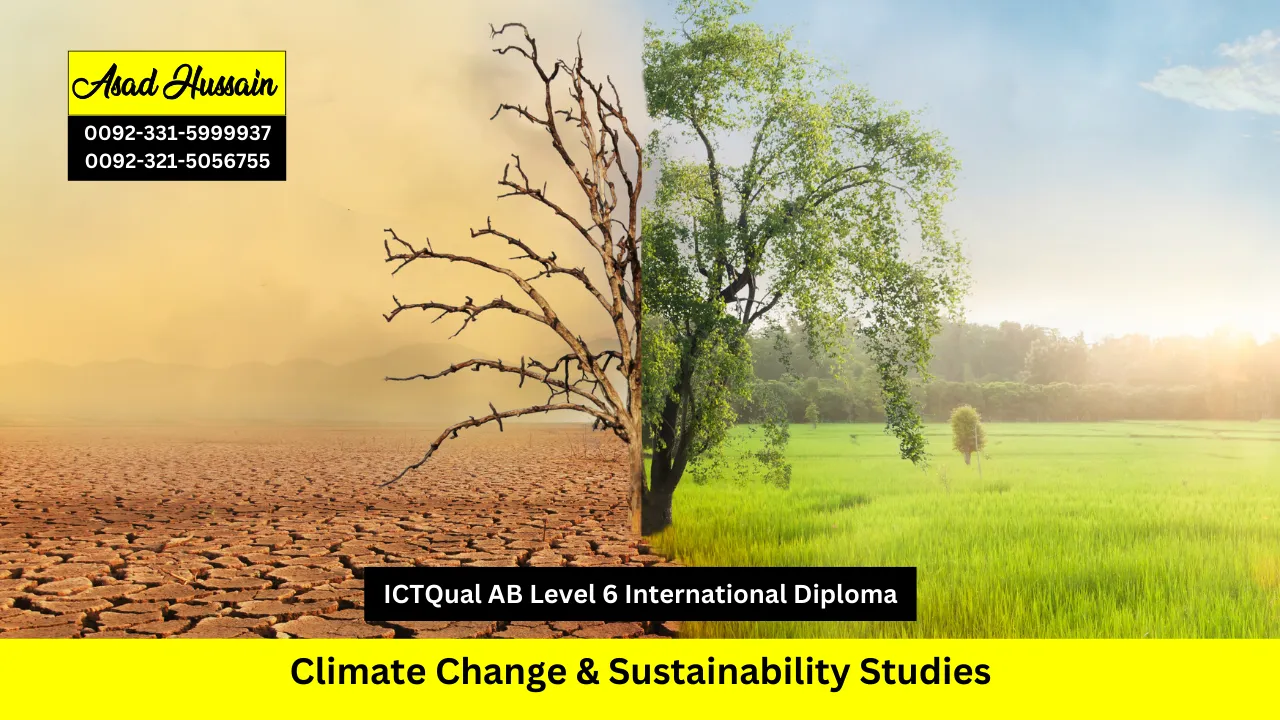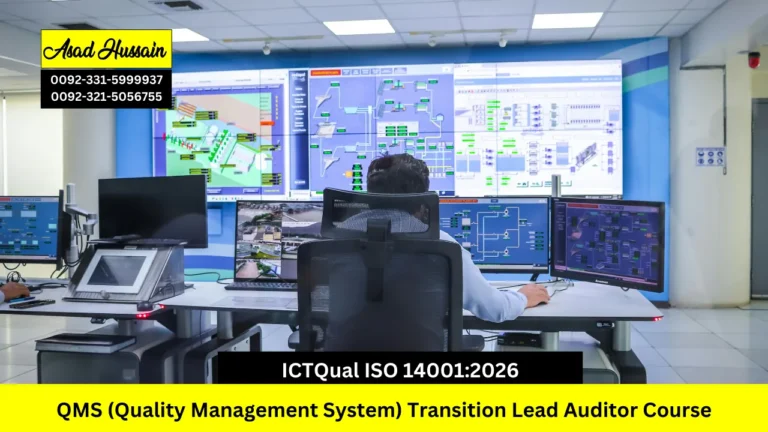Climate change has emerged as one of the most pressing global challenges of the 21st century, impacting economies, ecosystems, and communities worldwide. The ICTQual AB Level 6 International Diploma in Climate Change & Sustainability Studies is designed to equip learners with advanced knowledge, skills, and strategies to understand and address the complexities of climate change while promoting sustainable development.
ICTQual ABLevel 6 International Diploma in Climate Change & Sustainability Studies provides a comprehensive framework that covers environmental science, climate policy, sustainable practices, renewable energy solutions, and adaptation strategies. Learners will gain the ability to analyze climate risks, develop mitigation measures, and design sustainability-focused solutions that align with global standards and international regulatory frameworks.
Through a blend of theoretical instruction, practical applications, and case studies, participants will build competencies in carbon management, sustainable business practices, climate adaptation planning, and environmental communication. ICTQual AB Level 6 International Diploma in Climate Change & Sustainability Studies is suitable for professionals, policy makers, sustainability advocates, and graduates seeking to enhance their expertise in the growing field of climate resilience and sustainable development.
By completing ICTQual AB Level 6 International Diploma in Climate Change & Sustainability Studies, learners will not only advance their careers but also play a vital role in shaping a sustainable future for generations to come. The diploma is British Council verifiable, MOFA and Embassy attestable, making it highly credible for global employability.
Program Highlights
Study Units
Year 1 – Foundations of Climate Change & Sustainability
- Introduction to Climate Change Science
- Principles of Sustainability and Environmental Management
- Global Environmental Policies and Governance
- Carbon Footprint and Greenhouse Gas Accounting
- Renewable Energy Fundamentals
- Climate Change Impacts and Adaptation Strategies
- Environmental Ethics and Professional Responsibility
- Sustainable Resource Management
- Environmental Monitoring and Data Analysis
- Introduction to Project Planning in Climate Initiatives
- Environmental Communication and Stakeholder Engagement
- Introduction to Risk Assessment in Environmental Management
Year 2 – Applied Climate Change & Sustainability Practices
- Advanced Climate Change Mitigation Strategies
- Sustainable Urban and Industrial Development
- Environmental Impact Assessment (EIA)
- Carbon Management and Trading
- Energy Efficiency and Renewable Integration
- Climate Policy Implementation and Compliance
- Waste Management and Circular Economy Principles
- Environmental Auditing and Reporting Techniques
- Digital Tools and Technologies for Sustainability
- Organisational Behaviour and Sustainability Leadership
- Research Methods in Climate and Sustainability Projects
- Applied Project Planning and Operational Management
Year 3 – Strategic Leadership in Climate Change & Sustainability
- Strategic Sustainability Leadership
- International Climate Agreements and Standards
- Environmental Risk and Crisis Management
- Corporate Social Responsibility (CSR) and Sustainability Strategy
- Sustainable Supply Chain and Resource Management
- Innovation and Emerging Technologies in Sustainability
- Climate Change Policy Development and Implementation
- Environmental Governance and Ethics in Leadership
- Advanced Project Management for Sustainability Initiatives
- Renewable Energy Systems and Integration Strategies
- Independent Research Project in Climate Change & Sustainability
- Capstone Project: Applied Climate Change & Sustainability Studies
To maintain academic excellence and ensure learners are well-prepared for advanced study, the ICTQual AB Level 6 International Diploma in Climate Change & Sustainability Studies has clearly defined entry requirements. These criteria are designed to provide equal opportunities for students from diverse backgrounds while ensuring they have the necessary knowledge, skills, and experience to succeed in this specialized field.
Age Requirements
- Applicants must be 18 years or older at the time of enrollment.
- Mature learners with relevant professional or voluntary experience in sustainability, climate action, or environmental fields may also be considered.
Educational Requirements
- A Level 5 qualification or equivalent in Environmental Science, Sustainability, Engineering, or a related discipline is required.
- Alternatively, learners who have completed a related program such as the ICTQual AB Level 5 Diploma in Environmental Management may apply directly to this course.
Professional Experience
- At least 2 years of work experience in environmental management, renewable energy, sustainability initiatives, or climate-related projects is preferred.
- Applicants with experience in policy development, corporate sustainability, or NGO/community projects are encouraged to apply.
English Language Proficiency
- Non-native English speakers must demonstrate language proficiency, typically with an IELTS score of 5.5 or equivalent.
- Applicants who have completed previous qualifications in English may be exempted from this requirement.
In conclusion, these entry requirements ensure that learners entering the program are academically capable and professionally prepared to engage with advanced concepts in climate change and sustainability studies. By admitting candidates with both educational foundations and practical experience, the course fosters a dynamic learning environment that enhances knowledge-sharing, critical thinking, and global employability.
The ICTQual AB Level 6 International Diploma in Climate Change & Sustainability equips learners with advanced knowledge, practical skills, and strategic competencies to address global climate challenges, implement sustainability initiatives, and lead environmental projects. The ICTQual AB Level 6 International Diploma in Climate Change & Sustainability Studies integrates theoretical understanding with hands-on applications, preparing graduates for leadership roles in climate change mitigation, sustainability management, and environmental governance.
Year 1 – Foundations of Climate Change & Sustainability
Introduction to Climate Change Science
- Explain the science and mechanisms driving climate change.
- Analyze climate data and trends using scientific methods.
- Apply foundational climate knowledge to environmental problem-solving.
Principles of Sustainability and Environmental Management
- Understand key sustainability concepts and environmental management practices.
- Apply sustainability principles to organizational and project contexts.
- Evaluate environmental performance using measurable indicators.
Global Environmental Policies and Governance
- Explain international environmental policies, agreements, and governance frameworks.
- Apply policy knowledge to sustainability planning and compliance.
- Assess organizational alignment with global environmental standards.
Carbon Footprint and Greenhouse Gas Accounting
- Calculate and analyze carbon footprints for individuals, organizations, and projects.
- Apply greenhouse gas accounting methodologies to measure emissions.
- Evaluate emission reduction strategies using measurable metrics.
Renewable Energy Fundamentals
- Understand different renewable energy sources and technologies.
- Apply basic energy assessment techniques in environmental projects.
- Evaluate potential integration of renewable solutions in practical scenarios.
Climate Change Impacts and Adaptation Strategies
- Identify climate change impacts on ecosystems, societies, and economies.
- Apply adaptation strategies to mitigate negative effects.
- Assess adaptation measures using measurable outcomes.
Environmental Ethics and Professional Responsibility
- Demonstrate ethical decision-making in environmental and sustainability contexts.
- Apply professional standards to sustainability practices.
- Evaluate ethical compliance in project and organizational activities.
Sustainable Resource Management
- Manage natural resources efficiently using sustainability principles.
- Apply strategies for water, energy, and material conservation.
- Assess resource management outcomes against sustainability benchmarks.
Environmental Monitoring and Data Analysis
- Conduct environmental monitoring using modern tools and techniques.
- Analyze environmental data to inform decision-making.
- Evaluate monitoring outcomes against regulatory and sustainability standards.
Introduction to Project Planning in Climate Initiatives
- Plan climate and sustainability projects effectively.
- Apply project management principles to ensure timely and successful outcomes.
- Evaluate project performance using measurable metrics.
Environmental Communication and Stakeholder Engagement
- Develop strategies for effective communication on climate and sustainability issues.
- Engage stakeholders in decision-making and project implementation.
- Assess communication effectiveness and stakeholder participation.
Introduction to Risk Assessment in Environmental Management
- Identify environmental risks and potential impacts.
- Apply risk assessment methodologies to sustainability projects.
- Evaluate risk mitigation strategies using measurable outcomes.
Year 2 – Applied Climate Change & Sustainability Practices
Advanced Climate Change Mitigation Strategies
- Develop strategies to reduce greenhouse gas emissions.
- Apply mitigation techniques in practical organizational and community projects.
- Assess the effectiveness of mitigation measures using measurable standards.
Sustainable Urban and Industrial Development
- Apply sustainability principles to urban planning and industrial processes.
- Evaluate environmental impacts of urban and industrial activities.
- Develop actionable solutions for sustainable development.
Environmental Impact Assessment (EIA)
- Conduct comprehensive environmental impact assessments for projects.
- Apply EIA frameworks to identify and mitigate environmental risks.
- Evaluate assessment outcomes and compliance with regulatory requirements.
Carbon Management and Trading
- Implement carbon reduction and offset strategies.
- Apply knowledge of carbon markets and trading mechanisms.
- Assess carbon management effectiveness using measurable metrics.
Energy Efficiency and Renewable Integration
- Optimize energy use in organizations and projects.
- Apply renewable energy integration strategies for sustainability.
- Evaluate energy performance using measurable standards.
Climate Policy Implementation and Compliance
- Apply national and international climate policies in practical contexts.
- Ensure compliance with environmental regulations and sustainability standards.
- Monitor and evaluate policy implementation effectiveness.
Waste Management and Circular Economy Principles
- Apply waste reduction, reuse, and recycling strategies in projects.
- Implement circular economy principles to enhance sustainability.
- Assess waste management outcomes using measurable criteria.
Environmental Auditing and Reporting Techniques
- Conduct environmental audits and sustainability assessments.
- Apply reporting standards to communicate environmental performance.
- Evaluate audit outcomes for compliance and improvement opportunities.
Digital Tools and Technologies for Sustainability
- Utilize software and digital platforms for sustainability management.
- Apply data analytics and modeling to support decision-making.
- Evaluate technological impact on sustainability outcomes.
Organisational Behaviour and Sustainability Leadership
- Apply leadership principles to drive sustainability initiatives.
- Manage teams and organizational change for environmental performance.
- Assess leadership effectiveness using measurable KPIs.
Research Methods in Climate and Sustainability Projects
- Conduct qualitative and quantitative research for climate initiatives.
- Analyze data to support evidence-based sustainability decisions.
- Present research findings using professional and measurable standards.
Applied Project Planning and Operational Management
- Implement practical sustainability projects using project management principles.
- Monitor project execution to ensure environmental and operational compliance.
- Evaluate outcomes against project objectives and sustainability metrics.
Year 3 – Strategic Leadership in Climate Change & Sustainability
Strategic Sustainability Leadership
- Develop long-term sustainability strategies for organizations and communities.
- Apply leadership skills to influence environmental policy and practice.
- Assess strategic impact using measurable outcomes.
International Climate Agreements and Standards
- Analyze global climate agreements and standards.
- Apply international guidelines to organizational sustainability initiatives.
- Evaluate compliance and performance against global benchmarks.
Environmental Risk and Crisis Management
- Develop strategies to manage environmental risks and crises.
- Apply crisis management frameworks to real-world sustainability challenges.
- Assess effectiveness of risk mitigation and response strategies.
Corporate Social Responsibility (CSR) and Sustainability Strategy
- Design CSR initiatives aligned with sustainability goals.
- Apply CSR strategies to enhance organizational environmental responsibility.
- Evaluate impact of CSR programs using measurable indicators.
Sustainable Supply Chain and Resource Management
- Implement sustainability practices across supply chains.
- Apply resource optimization techniques for environmental efficiency.
- Assess supply chain performance using sustainability metrics.
Innovation and Emerging Technologies in Sustainability
- Evaluate emerging technologies such as renewable energy, AI, and IoT for sustainability applications.
- Apply innovative solutions to enhance environmental performance.
- Assess technological adoption and outcomes against sustainability goals.
Climate Change Policy Development and Implementation
- Develop climate policies for organizations and communities.
- Apply policy frameworks to implement effective sustainability initiatives.
- Evaluate policy impact using measurable performance indicators.
Environmental Governance and Ethics in Leadership
- Apply ethical principles and governance frameworks in sustainability leadership.
- Ensure accountability and transparency in environmental decision-making.
- Assess governance effectiveness using measurable standards.
Advanced Project Management for Sustainability Initiatives
- Plan and manage complex sustainability projects strategically.
- Apply advanced project management tools for successful execution.
- Evaluate project outcomes against strategic objectives and sustainability targets.
Renewable Energy Systems and Integration Strategies
- Design and implement renewable energy systems for practical applications.
- Integrate renewable technologies into organizational operations.
- Assess energy performance and sustainability impact using measurable standards.
Independent Research Project in Climate Change & Sustainability
- Conduct independent research on contemporary climate and sustainability topics.
- Apply analytical and problem-solving skills to real-world challenges.
- Present research findings professionally using measurable standards.
Capstone Project: Applied Climate Change & Sustainability Studies
- Integrate knowledge and skills from all units into a comprehensive applied project.
- Apply strategic, operational, and leadership competencies to sustainability challenges.
- Evaluate project success using measurable performance and environmental impact indicators.
Upon completion, learners will possess advanced knowledge, practical skills, and professional competencies to lead climate change mitigation initiatives, implement sustainable practices, and manage environmental projects at national and international levels.
The ICTQual AB Level 6 International Diploma in Climate Change & Sustainability Studies is designed for learners who aspire to become experts in climate action, sustainability, and environmental management. This program is suitable for both fresh learners and professionals seeking to enhance their knowledge, skills, and career opportunities in sustainability-focused roles.
Characteristics of the Ideal Learner
- Passionate about Environmental Sustainability: Demonstrates strong interest in climate change, renewable energy, and sustainable practices.
- Analytical and Problem-Solving Skills: Capable of analyzing environmental data, assessing risks, and devising practical solutions.
- Leadership and Strategic Thinking: Eager to lead sustainability projects, influence policy, and implement environmental strategies.
- Tech-Savvy and Innovative: Comfortable using digital tools, data analytics, and emerging technologies for sustainability initiatives.
- Committed to Continuous Learning: Motivated to acquire advanced knowledge, research skills, and professional competencies in climate change and sustainability.
- Team-Oriented and Collaborative: Willing to work in multidisciplinary teams and engage stakeholders effectively for sustainable outcomes.
- Ethically and Socially Responsible: Demonstrates awareness of ethical practices and corporate social responsibility in environmental decision-making.
Learners completing ICTQual AB Level 6 International Diploma in Climate Change & Sustainability Studies will be equipped with the knowledge, practical skills, and leadership competencies needed to excel in sustainability-focused roles globally, driving positive environmental and societal impact.







